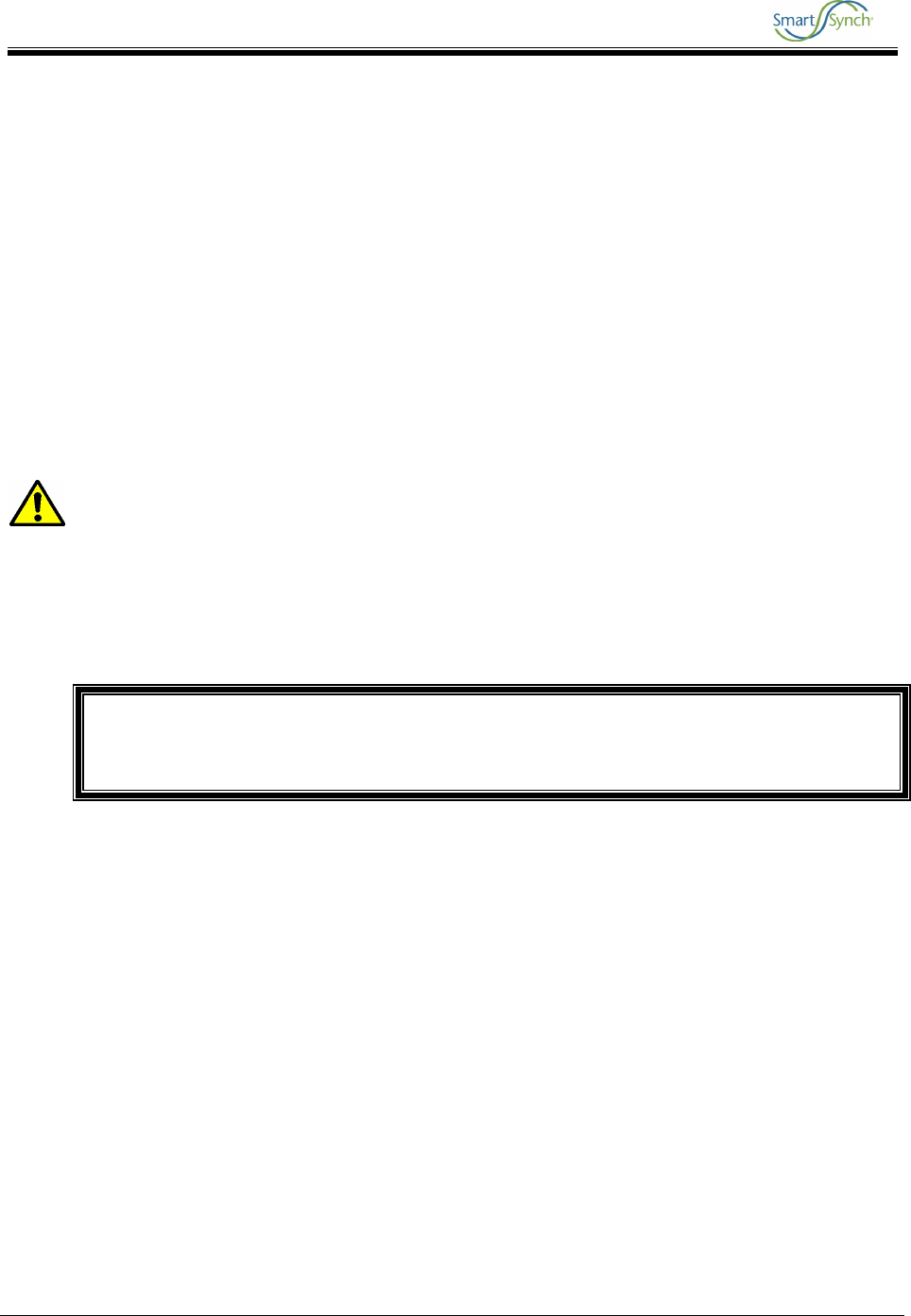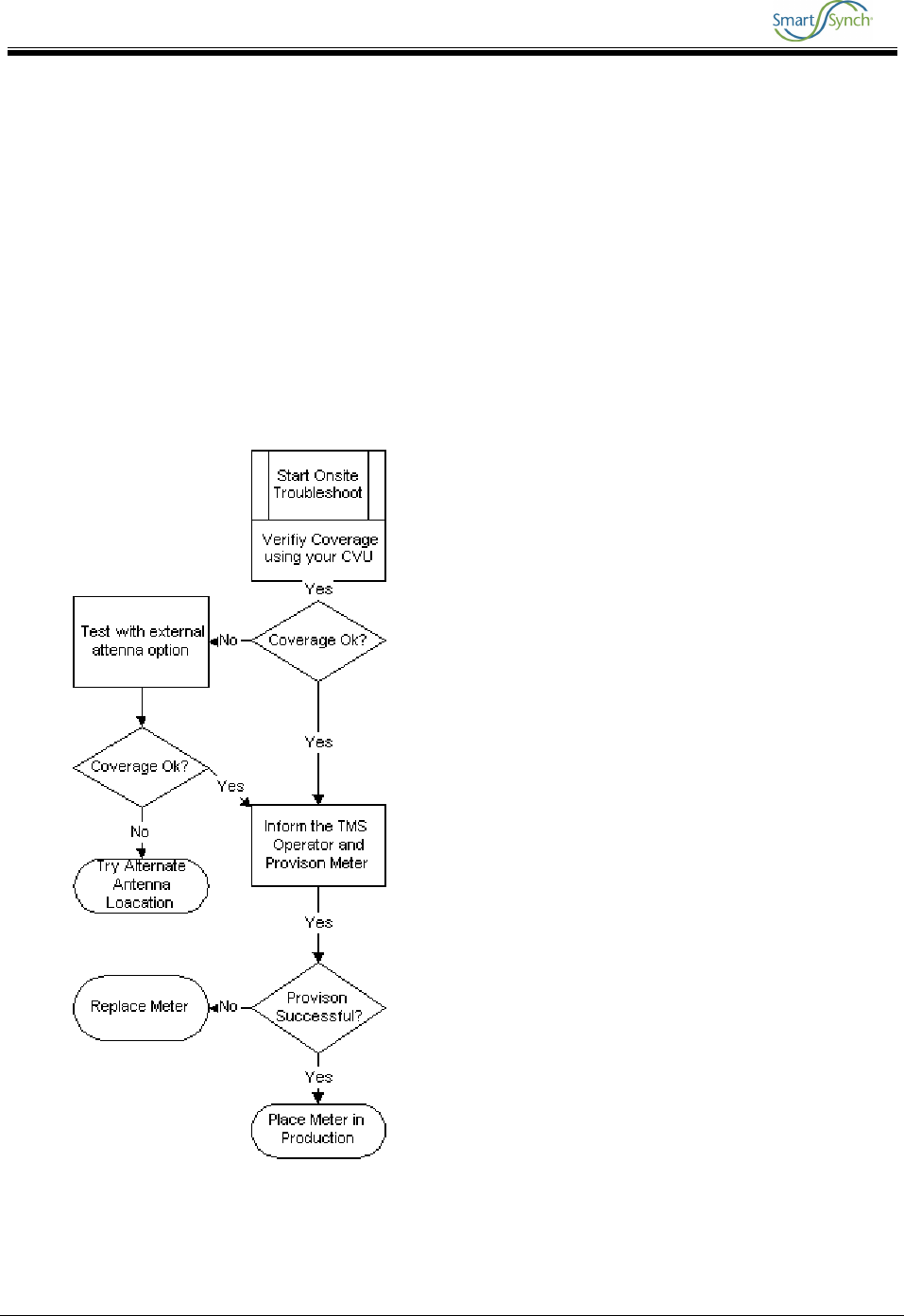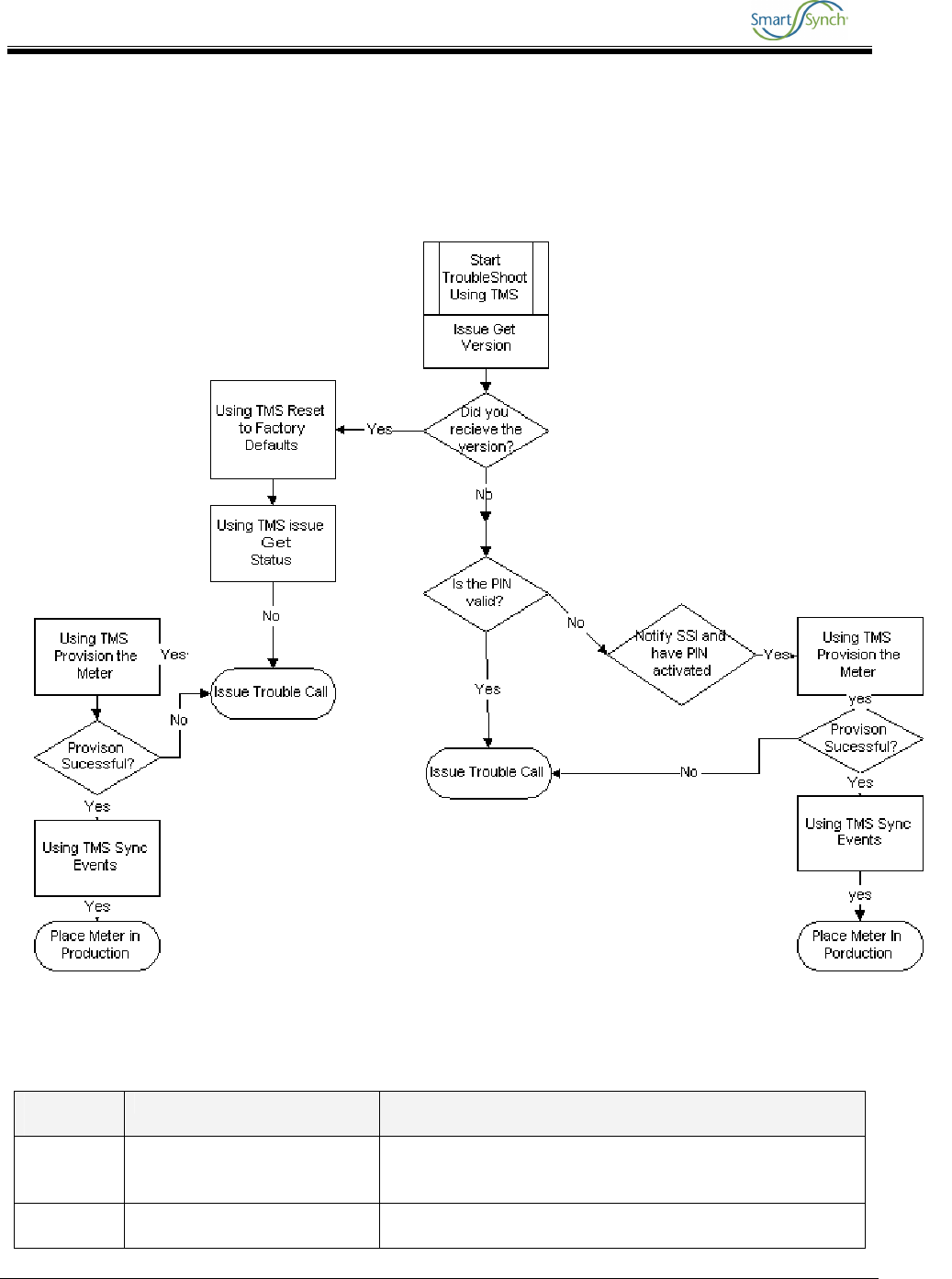User Manual

SSI G24 I210 SmartMeter User Guide
SMR45-4601B 1
SmartMeter™ System
SSI G24 I210
SmartMeter
User Guide

SSI G24 I210 SmartMeter User Guide
SMR45-4601B 2
Copyrights
Copyright 2006 SmartSynch
®
, Inc. All rights reserved.
No part of this documentation may be reproduced transmitted, processed, or recorded by any means or
form, or be released to any third party without the express written consent of SmartSynch, Inc.
Trademarks
SmartSynch
®
, SmartSynch logo, TMS™, and SmartMeter™ are trademarks or registered trademarks of
SmartSynch, Inc. All other companies, brands, and product names listed herein are trademarks or
registered trademarks of their respective holders.
Document Revisions
The SSI G24 I210 SmartMeter User Guide can be referred to by its document number: Each revision of
this document is designated with a letter, beginning with “A”. SmartSynch, Inc. reserves the right to revise
this publication and to make any modifications to its content, at any time, without obligation to notify any
party, person, or entity of such revisions or changes. Occasionally, changes or variations exist in the
products that are not reflected in the documentation. Generally, if such changes or variations are known
to exist and affect the product significantly, release notes will accompany the documentation.
The information in this guide should not be considered as all-inclusive or covering all cases for events
that may occur. If further information is required, consult your technical support representative.
See the License Agreement contained in the product for complete license information.
Contact your technical support representative for more information on any of our products.

SSI G24 I210 SmartMeter User Guide
SMR45-4601B 3
Table of Contents
1
INTRODUCTION ...............................................................................................................................................5
1.1
ABOUT THIS GUIDE ........................................................................................................................................5
1.2
REFERENCE MATERIALS.................................................................................................................................5
1.3
CONTACTING SMARTSYNCH...........................................................................................................................5
1.3.1
Technical Support..................................................................................................................................5
1.3.2
Documentation Feedback ......................................................................................................................6
1.3.3
SmartSynch Headquarters .....................................................................................................................6
2
GETTING STARTED.........................................................................................................................................7
2.1
OPERATIONS...................................................................................................................................................7
2.2
SAFETY PRECAUTIONS....................................................................................................................................7
2.2.1
Interference with Medical Equipment....................................................................................................7
2.2.2
Fire or Explosion Hazards ....................................................................................................................7
2.2.3
Interference with Other Devices ............................................................................................................8
2.3
PREREQUISITES...............................................................................................................................................8
3
INSTALLING THE SSI G24 I210 SMARTMETER .......................................................................................9
3.1
PRELIMINARY INSPECTIONS............................................................................................................................9
3.2
INSTALLATION PROCESS.................................................................................................................................9
3.2.1
Option 1: Direct Field Installation ........................................................................................................9
3.2.2
Option 2: Meter Shop Test and Field Installation .................................................................................9
3.2.3
Meter Installation ..................................................................................................................................9
3.3
PROVISIONING THE SMARTMETER ...............................................................................................................10
4
TROUBLESHOOTING ....................................................................................................................................11
4.1
TROUBLESHOOTING PROCESS FLOW.............................................................................................................11
4.2
TROUBLESHOOTING PROCESS DESCRIPTION.................................................................................................12
5
REQUIREMENTS AND COMPLIANCE ......................................................................................................14
5.1
FCC GRANT STATEMENT .............................................................................................................................14
5.2
COMPLIANCE STATEMENT (PART 15.19/RSS-210/ICES-003)......................................................................14
5.3
WARNING (PART 15.21) ...............................................................................................................................14
5.4
RF RADIATION SAFETY GUIDELINES PER PART 2 OF FCC RULES AND REGULATIONS .................................14
5.5
USER INFORMATION (PART 15.105) .............................................................................................................15

SSI G24 I210 SmartMeter User Guide
SMR45-4601B 5
1 Introduction
1.1 About This Guide
This document is a manual designed to help guide you through the testing, installation and activation of
your SSI G24 I210 SmartMeter. This manual provides general instructions on the support of your
SmartMeter and references to supporting manufacturer documentation for detailed guidelines and
instructions on features and operating characteristics of the SmartMeter for installation, programming,
communication, and troubleshooting.
1.2 Reference Materials
The following reference software and documentation are pertinent to the successful installation and use
of the SSI G24 I210 SmartMeter:
GE
• I210 Device Manual
• MeterMate Software
• MeterMate Installation Guide
• MeterMate User Guide
SmartSynch
For more information on the SSI G24 I210 SmartMeter, see the product brochure and spec sheet,
available online at http://smartsynch.com/support/documents/CENTRON_SmartMeter_e.pdf.
1.3 Contacting SmartSynch
1.3.1 Technical Support
SmartSynch’s technical support staff is ready to answer your technical questions. Your technical support
representative can provide information about the latest SmartSynch products, upgrade options, and more.
Contact your technical support representative directly, through the Online Customer Support Center at
http://smartsynch.com/support/login.html, or by email at cs@smartsynch.com.
Note: You must be a registered user to access SmartSynch’s online support services.
Help us help you
When contacting technical support please provide the following information for the fastest possible
service:
• Your name, company name, and contact number
• SmartMeter make and model (meter manufacturer, SSI version number)
• Complete description of the issue, including the steps to reproduce it
• Wording of any message(s) displayed when the issue was encountered
• Action taken to resolve the problem

SSI G24 I210 SmartMeter User Guide
SMR45-4601B 6
1.3.2 Documentation Feedback
SmartSynch, Inc. strives to produce quality documentation for our products and welcomes your feedback.
If you have comments or recommendations about our online help or printed guides, you can email us.
Please send email messages to cs@smartsynch.com. This email address is only for documentation
feedback. If you have a technical question, please contact your technical support representative.
1.3.3 SmartSynch Headquarters
SmartSynch, an energy technology company based in Jackson, Mississippi, is the leading provider of
advanced metering solutions to the energy and utility industry. Its core product, the SmartMeter System,
enables energy and utility companies to communicate with commercial and industrial electricity meters
using wireless communications and the Internet. The SmartMeter System manages the delivery of critical
information to any application system, workstation, computer, or browser-enabled personal
communication device.
Mailing Address: SmartSynch, Inc. Telephone: 601-362-1780
P.O. Box 12250
Jackson, MS 39236-2250 Fax: 601-362-1787
Street Address: 4400 Old Canton Road World Wide Web: www.smartsynch.com
Suite 300
Jackson, MS 39211 Office Hours: 8:00 a.m. to 5:00 p.m.
Central Time

SSI G24 I210 SmartMeter User Guide
7
2 Getting Started
Please review the reference documentation before you begin the installation and use of the supporting
software.
2.1 Operations
The SSI G24 I210 SMartMeter is a GE I210 electronic single-phase electricity meter integrated with a
SmartSynch Interface (SSI) Module, which fully supports ANSI standards for electricity metering and is
intended for use by commercial and industrial utility customers.
The SSI G24 I210 SmartMeter offers you secure over-the-air transfer of data between the SmartMeter
and the TMS (Transaction Management System).
2.2 Safety Precautions
The SSI G24 I210 SmartMeter contains a Motorola G24 GPRS Cellular Engine for wireless
communication purposes. The following safety precautions pertain to the hazards related to this device’s
radio frequency (RF) functionality and must be observed during all phases of installation, operation,
service, and repair. Failure to comply with these precautions violates safety standards of design,
manufacture, and intended use of the product.
WARNING!
Use authorized utility procedures for installing, maintaining, and removing a SmartMeter.
Equipment damage, personal injury, or death can result if devices are not properly
installed and operated.
2.2.1 Interference with Medical Equipment
Before installing the SSI G24 I210 SmartMeter on the premises of a hospital or other health care facility,
observe the restrictions on the use of mobile communication devices in sensitive areas. Some medical
equipment may be sensitive to radio frequency (RF) energy, possibly requiring the meter to be properly
shielded or placed in an alternate location.
The operation of cardiac pacemakers, hearing aids, and other implanted medical equipment can be
affected by interference from cellular devices placed too closely. Pacemaker patients are advised to
observe the same precautions recommended for handheld mobile phones while installing or operating the
SSI G24 I210 SmartMeter.
2.2.2 Fire or Explosion Hazards
Do not install or operate the SSI G24 I210 SmartMeter in the presence of flammable gases or fumes. This
includes gasoline stations, fuel depots, chemical plants, or sites where blasting operations are in
progress. Operation of any electrical equipment in potentially explosive atmospheres can constitute a
safety hazard.

SSI G24 I210 SmartMeter User Guide
8
2.2.3 Interference with Other Devices
The communication module embedded in the SSI G24 I210 SmartMeter receives and transmits radio
frequency (RF) energy while in operation. Interference can occur if it is placed too close to televisions,
radios, computers, or inadequately sheltered equipment. Follow any applicable regulations if you suspect
that this device may cause interference or danger.
2.3 Prerequisites
To perform the installation of your SmartMeter, you must have access to the following supporting software
and should have reviewed relevant documentation:
GE MeterMate (Meter Configuration and Analysis Tool) software, for programming the SSI G24 I210
SMartMeter. MeterMate is a Microsoft Windows-based tool that communicates with the I210 meter for
program development, meter programming, meter reading, meter testing, and report generation.
MeterMate system requirements and installation instructions may be obtained in the:
• MeterMate Installation Guide
• MeterMate User Guide

SSI G24 I210 SmartMeter User Guide
9
3 Installing the SSI G24 I210 SmartMeter
3.1 Preliminary Inspections
The SSI G24 I210 SmartMeter is calibrated and tested at the factory and is ready for installation. Before
installing and applying power to the SmartMeter, a quick inspection of the SmartMeter is recommended to
ensure there is no damage to the SmartMeter, which could possibly occur during shipping. Physical
damage to the SmartMeter indicates potential damage to the inside of the SmartMeter. Do not connect
power to a SmartMeter that is suspected of having internal damage. Contact your SmartSynch technical
support representative if you suspect your SmartMeter is damaged.
3.2 Installation Process
The customer will receive meters in a “Preconfigured” state. This means that meters have been
integrated with an SSI SmartMeter Module loaded with the SSI embedded software, an inactive (unless
shipped active per customer request) cellular network Subscriber Identity Module (SIM) card, and has
passed several quality control stages. In addition, a Ship file containing device specific information has
been generated by SmartSynch for the customer. This file is imported into a configuration server by SSI
personnel and a copy is provided to the customer. Upon SIM card activation, upon shipment, or later
upon customer request, an Activation file containing cellular network-specific information is generated.
This file is also imported into the configuration server and a copy is provided to the customer.
Typically, a customer can deploy the meter using one of two methods, depending
on business needs:
3.2.1 Option 1: Direct Field Installation
This option is used when the customer prefers immediate deployment of the meters “from the box to the
base.” This option is desirable in a deployment situation where a large number of meters need to be
deployed in a relatively short period of time. The customer-specific information is automatically Over-the-
Air downloaded to the SSI module upon energizing the meter and no addition action is needed on-site.
Follow the meter installation instructions in Section 3.2.3.
3.2.2 Option 2: Meter Shop Test and Field Installation
There is no need for the Meter Shop to reprogram and test the SmartMeter when it arrives. Upon
shipment, the meter will have undergone significant functional and RF testing at the factory. Internal
quality control checks will ensure the SSI module is able to communicate with the meter successfully as
well as communicate with all other internal components before it is shipped. The device will also arrive in
a generic “Preconfigured” state with no customer-specific data stored in internal memory. There is no
need for the Meter Shop to perform any programming steps on the meter.
3.2.3 Meter Installation
1. The installer verifies network coverage with a SmartSynch Coverage Validation Unit (CVU).
Note: If the option board display codes are enabled in the meter program, the Received
Signal Strength Indicator (RSSI) display values can be used to verify coverage
without the CVU. Refer to section 5 for additional information.
2. The meter is placed in the socket and energized. The meter is now in the Pre-Configured state.

SSI G24 I210 SmartMeter User Guide
10
3. Once in the Pre-Configured state, the SSI embedded software transmits an Auto-Configuration
message to the configuration server.
4. Upon receiving the meter’s Auto-Configuration message, the configuration server will set all of the
customer specific parameters into the SSI module’s non-volatile memory.
5. When the SSI module inside the meter is fully configured with the customer specific information it
will immediately send an Auto-Registration message to the customer’s TMS server.
6. If the meter successfully communicates with TMS the Registration message is processed and the
meter sends a confirmation message back to the configuration server.
7. The meter is added/updated in the “Registration Group” under the Master List in TMS.
8. The meter is now in the “Placed” state.
9. The meter is ready to receive the Provisioning commands from TMS.
10. Once the meter is provisioned, meter data can be collected from the meter.
3.3 Provisioning the SmartMeter
The provisioning process must be completed to ensure the resulting transaction communication between
the TMS and the device is correctly interpreted. If the provisioning process does not run to completion
within 30 minutes, the TMS Operator should confirm that coverage validation procedures were properly
followed and then review the PIN settings in the Device properties setup.
Next, the operator should check the events in Monitoring Home>Event Search that have occurred within
the time following the provision request.
There should be a response within a short time period from the specified device showing the version of
the SSI Module, since the Get Version transaction is the initial start of the provisioning process. Once the
Get Version response is returned to the TMS for the TMS to determine certain attributes of the Device,
the TMS sends a number of other transactions to the device to complete the provisioning process.
If the Get Version does not complete successfully, check your Device PIN configuration.
If there is no response of the initial provisioning transaction, follow the troubleshooting processes outlined
in Section 4. If unsuccessful, check the status of your local Internet connection, and then contact
SmartSynch Customer Support for assistance.

SSI G24 I210 SmartMeter User Guide
11
4 Troubleshooting
4.1 Troubleshooting Process Flow
The troubleshooting support directives may involve a number of participants to resolve the issue,
depending on the type of issue involved. Resolution may include TMS Administrators, TMS Operators,
Field Meter Support personnel, or any user who may be required to support the TMS, its clients, or
related data.
Section 4.2 describes the required corrective action that corresponds with each step in the flowcharts.
The first chart describes the process for Onsite (Field) troubleshooting, and the next describes the
process from the TMS Operator’s perspective
Onsite Troubleshooting Flowchart

SSI G24 I210 SmartMeter User Guide
12
With either process, be sure to perform these initial steps:
1. Confirm that the meter is actually installed in the field.
2. Verify that the PIN for that meter is correct.
3. Verify that the site exceeds the acceptable minimums using the Coverage Validation Unit.
TMS Troubleshooting Flowchart (for meters that have been previously provisioned successfully)
4.2 Troubleshooting Process Description
Process
Steps
Description Action
1
Is Meter Installed in field? Check work orders, inventory management, or verify with
Field Personnel that meter is installed and energized at a
valid Customer location.
2 Install Meter
Refer to the Installation section of this document

SSI G24 I210 SmartMeter User Guide
13
Process
Steps
Description Action
3 Is Pin # Correct? Validate that the pin number in the TMS system is
indeed the pin number that is matched with the correct
meter. Checking the manufacturer’s spreadsheet sent
with the meters and/or visually inspecting the label on
the meter can accomplish this task.
4 Did site pass CVU tests?
Check Meter Test Person’s site validation notes and
verify that test were properly run and meet the minimum
requirements.
5 Get Version? Perform Get Version ANSI action on device. (See TMS
User Guide)
6 Restore Meter to Factory
Defaults?
Perform Restore Meter to Factory Defaults ANSI (see
TMS User Guide)
7 Get Status? Perform Get Status ANSI action on device. (See TMS
User Guide)
8 Get Status Successful? Check the results of the Get Status ANSI using Event
Search and View Details. (See TMS User Guide)
9 Execute the following Task:
Provision
Execute Provision on the meter. (See TMS User Guide)
10 Did the meter provision?
Check the results of the Provision ANSI using Event
Search and View Details. (See TMS User Guide)
11 Sync System to Device
If meter is already in a Functional Group, user will need
to execute task Sync System to device. (See TMS User
Guide)
12 Put meter into production
system
Do the necessary paperwork to put meter on production
system and notify appropriate stakeholders.
13 Ping the Module Using the
Internet/Web Browser
Go to the Network web page. Send a message tab.
Enter in the pin number of the device and a
miscellaneous message in the message field. Click
Send. (See Section 4.2.1)
14 Is Pin Active?
After using the internet/web browser, does the screen
say message submitted (yes) or invalid pin (no)? (See
Section 4.2.1)
15 Activate Pin Through
SmartSynch
Log on to the OCS and create a new case for the invalid
pin. SmartSynch Personnel will take care of the issue
and notify the user when the PIN is active.
16 Field Site Visit - Call into
TMS Operator
Dispatch a meter tech to perform the Onsite
troubleshooting procedure and have them call into the
TMS operator at the time of completion.
17 Bring Meter in for evaluation
Replace meter with another SmartMeter and bring into
Meter Shop for further evaluation.

SSI G24 I210 SmartMeter User Guide
14
5 Requirements and Compliance
The SSI G24 I210 SmartMeter is compliant with all applicable Federal Communications Commission
(FCC) requirements. The FCC identification numbers for the SSI G24 I210 SmartMeter are listed as
follows:
FCC identifier: QHC-I210G24
IC Identifier: 4393B-I210G24
This certification is granted to SmartSynch Inc.
5.1 FCC Grant Statement
The antennas used for this transmitter must be installed to provide a minimum separation
distance of 20 cm from all persons, and must not be co-located or operate in conjunction
with any other antenna or transmitter.
5.2 Compliance Statement (Part 15.19/RSS-210/ICES-003)
NOTICE:
This device complies with Part 15 of the FCC Rules [and with RSS-210 of Industry Canada].
Operation is subject to the following two conditions:
(1) this device may not cause harmful interference, and
(2) this device must accept any interference received, including interference that may cause
undesired operation.
Le présent appareil est conforme aux CNR d'Industrie Canada applicables aux appareils radio
exempts de licence. L'exploitation est autorisée aux deux conditions suivantes:
(1) l'appareil ne doit pas produire de brouillage, et
(2) l'utilisateur de l'appareil doit accepter tout brouillage radioélectrique subi, même si le brouillage est
susceptible d'en compromettre le fonctionnement.
NOTICE:
This Class [*] digital apparatus complies with Canadian ICES-003.
Cet appareil numérique de la classe [*] est conforme à la norme NMB-003 du Canada.
5.3 Warning (Part 15.21)
Changes or modifications not expressly approved by GE and SmartSynch Inc. may void the FCC
authorization to operate this equipment.
5.4 RF Radiation Safety Guidelines per Part 2 of FCC Rules and
Regulations
The meter should be installed in a location where there will be a separation greater than 20 cm (8 inches)
from locations occupied by humans.

SSI G24 I210 SmartMeter User Guide
15
5.5 User Information (Part 15.105)
The SSI G24 I210 SmartMeter has been tested and found to comply with the limits for a Class B digital
device, pursuant to part 15 of the FCC Rules. These limits are designed to provide reasonable protection
against harmful interference in a residential installation. This equipment generates, uses and can radiate
radio frequency energy and, if not installed and used in accordance with the instructions, may cause
harmful interference to radio communications. However, there is no guarantee that interference will not
occur in a particular installation. If this equipment does cause harmful interference to radio or television
reception, the user is encouraged to try to correct the interference by one or more of the following
measures:
• Reorient or relocate the receiving antenna.
• Increase the separation between the equipment and receiver.
• Connect the equipment into an outlet on a circuit different from that to which the receiver is
connected.
• Consult the dealer or an experienced radio/TV technician for help.